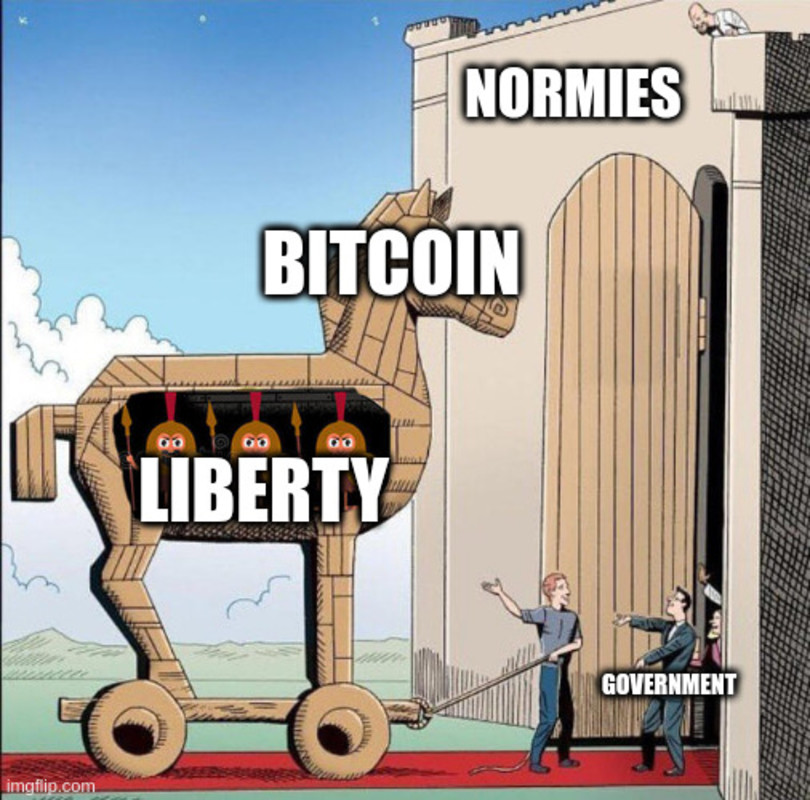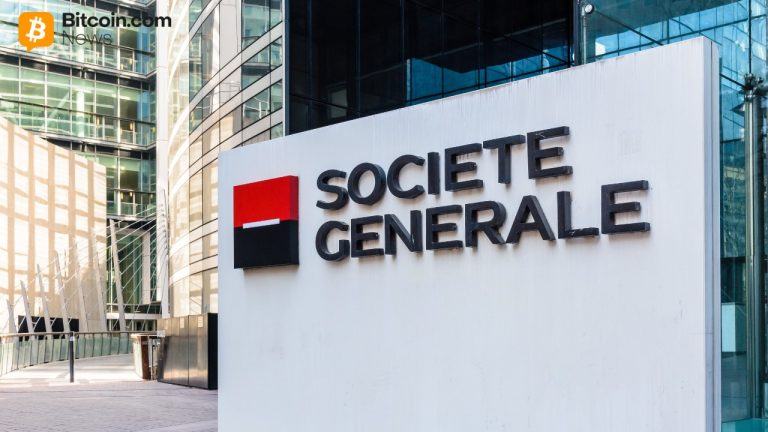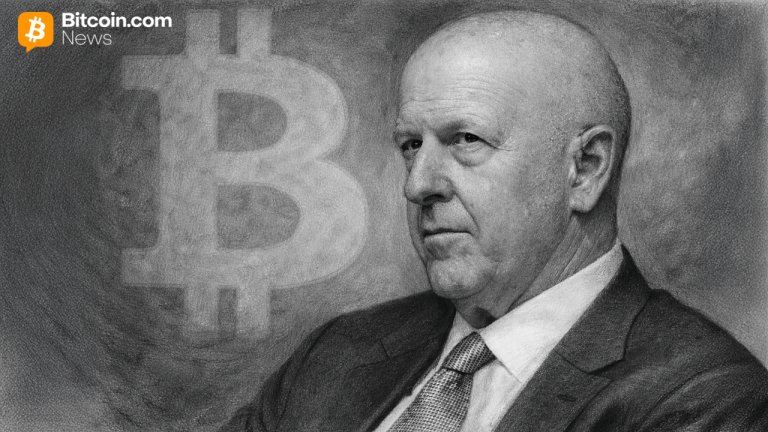Since its inception over 15 years ago, Bitcoin has captured the imagination of libertarians, anarchists, and a variety of other advocates of individual liberty and financial sovereignty. To them, Bitcoin represented a revolutionary challenge to State-controlled money and authority. As such, it has come to symbolize a disruptive shift toward greater freedom and autonomy for individuals in modern society.
Yet as Bitcoin gains mainstream traction, there are more and more signs it may be shedding its revolutionary roots. The exponential growth in users and market value has corresponded with a dilution of the liberty-oriented ethos that initially defined the technology. In a future hyperbitcoinized world, will Bitcoin still embody the libertarian ideals that sparked so much excitement among its early adherents? Or will it become just another compliant financial asset absorbed into the existing global monetary order?
This question goes beyond philosophical debates around crypto-anarchism and speaks to tangible decisions developers, miners, and users will be confronted with in Bitcoin's next decade. Hard tradeoffs between the cypherpunk vision of total financial freedom and necessary compromises for scalability lie ahead. Navigating these choices will determine whether Bitcoin realizes its disruptive potential or succumbs to the governmental forces it originally sought to circumvent.
In contemporary society, adopting the libertarian mindset is often deemed radical in contrast to mainstream allowable opinion—a perspective acknowledged by many within the libertarian community. The prevailing challenge lies in the pervasive acceptance of the superstition of statism, an entrenched belief system that liberty advocates conscientiously confront. Despite the formidable nature of this challenge, many libertarians remain committed to advancing liberty through diverse and strategic initiatives. Their collective efforts aim not only to challenge the status quo but also to instigate a profound shift in societal attitudes toward liberty.
The struggle against the prevailing acceptance of statism is an ongoing journey, and as dedicated advocates, they recognize the need for multifaceted approaches. From engaging in public discourse to fostering educational initiatives, their endeavors are rooted in the conviction that the principles of liberty are essential for a flourishing society. This commitment extends beyond ideological boundaries, encompassing a shared vision for a future where individual freedoms are valued and upheld.
As a liberty advocate, the discovery of Bitcoin marked a pivotal moment for me. As I began my journey down the rabbit hole, I couldn't help but feel an exhilarating excitement about the project. This cryptographic protocol offered a sly roundabout way to separate money from the State, providing a new practical way to advance liberty in our lifetime. Bitcoin embodied the principles of individual sovereignty and financial autonomy. It became a beacon for those seeking alternatives to the coercive centralized systems of the State.

The concept encapsulated in the meme "Bitcoin is a trojan horse for liberty" resonated deeply. It suggested that individuals, previously indifferent to the principles of liberty, might unknowingly embrace them while pursuing personal financial gains through Bitcoin. The idea that the "number go up" technology is, in essence, a covert "liberty go up technology" underscored the transformative potential of Bitcoin within the larger context of advancing individual freedoms and challenging traditional power structures. This aspect added another layer of significance to my appreciation of Bitcoin's role as a revolutionary force within the broader liberty movement.
Bitcoin has demonstrated its ability to empower individuals in bypassing authoritarian regimes. Organizations like the Human Rights Foundation and the Oslo Freedom Forum have effectively highlighted personal stories of how Bitcoin has positively transformed lives around the world. It has provided people with the ability to engage in transactions using currency free from government debasement and censorship. This sentiment reverberates within the Bitcoin community today, expressed through slogans such as "not your keys, not your coins," "be your own bank," and "we're separating money from the State!" There is a wealth of educational content dedicated to promoting these principles and emphasizing the increased freedom that comes with monetary sovereignty.
Additionally, Bitcoin enhances individual liberty by allowing individuals who are capable of saving the ability to store their value in a savings technology that is not subject to the government's Ponzi scheme of fiat money. Individuals can exchange in a currency that the government cannot censor, providing a secure and censorship-resistant medium for financial transactions. While these achievements are noteworthy and deserve recognition, there is an uncomfortable truth that often remains undiscussed or even ignored – the challenge of scaling the number of sovereign users on the network.
As you delve deeper into the world of Bitcoin, you'll gradually adopt a more technical perspective. While some find this understanding to be intuitive, others may face challenges. Nevertheless, you'll eventually confront the reality of blockchain scalability. Due to blocksize limitations, there exists a transactional throughput limit for each new block. The consensus solution embraced by the network was a layered scaling approach. Enter the Lightning Network, a second-layer solution designed to enhance the economic density of on-chain transactions. It enables two parties to engage in a multi-signature channel, facilitating a multitude of payments for each of the few required on-chain transactions, including opening, splicing, and closing of channels. Despite issues like liquidity management and online requirements, this engineering marvel significantly expands the network's transaction processing capabilities, almost without bounds. The only catch: Custodians will be necessary for the majority of users.
Despite the current implementation of the Lightning network, there is still a limitation on the number of sovereign users the network can accommodate. Despite improvements in payment scaling, the Bitcoin network can only support 10-100 million sovereign users who update lightning channels a few times a year—whether they are individuals, single custodians, or federated custodians implementing eCash systems. In a hyperbitcoinized world with over 8 billion people, it's easy to grasp the implications. The uncomfortable reality is that less than one percent of the global population will have the ability to use Bitcoin in a sovereign manner.
Achieving sovereignty with Bitcoin involves having exclusive control over a UTXO. Scaling the number of sovereign users on the network requires additional engineering efforts and consensus changes. It's essential to establish trust-minimized mechanisms for users to share a UTXO and address disputes over partial UTXO ownership without imposing excessive economic costs for resolution. There is currently ongoing discussion within pockets of the development community on how activating covenants could begin to address these issues, in particular how CTV can help scale Bitcoin as an initial building block for solutions to these sovereignty scaling problems.
The gravity of this issue and the urgency it carries harken back to the extent to which you truly value the principle of separating money from the State. We find ourselves at a pivotal juncture, pondering the course and significance of what a world fully immersed in hyperbitcoinization truly entails. Without intervention, we could find ourselves in a future where 99% of the population necessitates some form of custodianship to navigate the intricacies of the Bitcoin network.
This potential scenario raises a legitimate concern about the State potentially exerting control over the network in the future. The question of urgency becomes paramount. While I refrain from advocating reckless behavior and hasty implementation, there is a discernible sense that a metaphorical window of opportunity is closing in on us.
Reflecting on Bitcoin's history, it becomes evident that activating consensus changes to the network becomes progressively challenging as it expands. The growth of the network introduces complexities, making it exponentially more difficult to persuade an overwhelming majority to embrace a protocol upgrade unless there is an immense demand for such a change. This nuanced view highlights the need to carefully and promptly consider Bitcoin's evolving ecosystem dynamics.
My worry revolves around the pressing need for the majority of participants to genuinely value individual liberty, recognizing its significance in implementing crucial upgrades and addressing these prevalent scaling issues. Having ventured into the realm of Bitcoin from a libertarian standpoint, I'm painfully aware of the prevailing lack of regard for liberty among the majority in society. There's a genuine fear that Bitcoin, initially a cornerstone of the liberty movement, may gradually lose its essence and be relegated to just another financial asset—first gradually, then suddenly.
Confronting the present reality demands a pragmatic perspective, and acknowledging it for what it is rather than wishful thinking. To those who share the weight of my concerns, I passionately implore you to remain firmly grounded and unwavering in your commitment to championing individual liberty. Embrace, with genuine conviction, the pivotal role that Bitcoin plays in advancing this cause. The path ahead is formidable, requiring a united effort deeply connected to our collective purpose. Let's tackle the challenge of sovereignty scaling with authenticity, fully cognizant of the crucial work that lies ahead. Each of us possesses a unique and indispensable role in this organic endeavor—let's embrace it with authentic strength and unwavering determination.
This is a guest post by Michael Matulef. Opinions expressed are entirely their own and do not necessarily reflect those of BTC Inc or Bitcoin Magazine.

You can get bonuses upto $100 FREE BONUS when you:
💰 Install these recommended apps:
💲 SocialGood - 100% Crypto Back on Everyday Shopping
💲 xPortal - The DeFi For The Next Billion
💲 CryptoTab Browser - Lightweight, fast, and ready to mine!
💰 Register on these recommended exchanges:
🟡 Binance🟡 Bitfinex🟡 Bitmart🟡 Bittrex🟡 Bitget
🟡 CoinEx🟡 Crypto.com🟡 Gate.io🟡 Huobi🟡 Kucoin.



















Comments